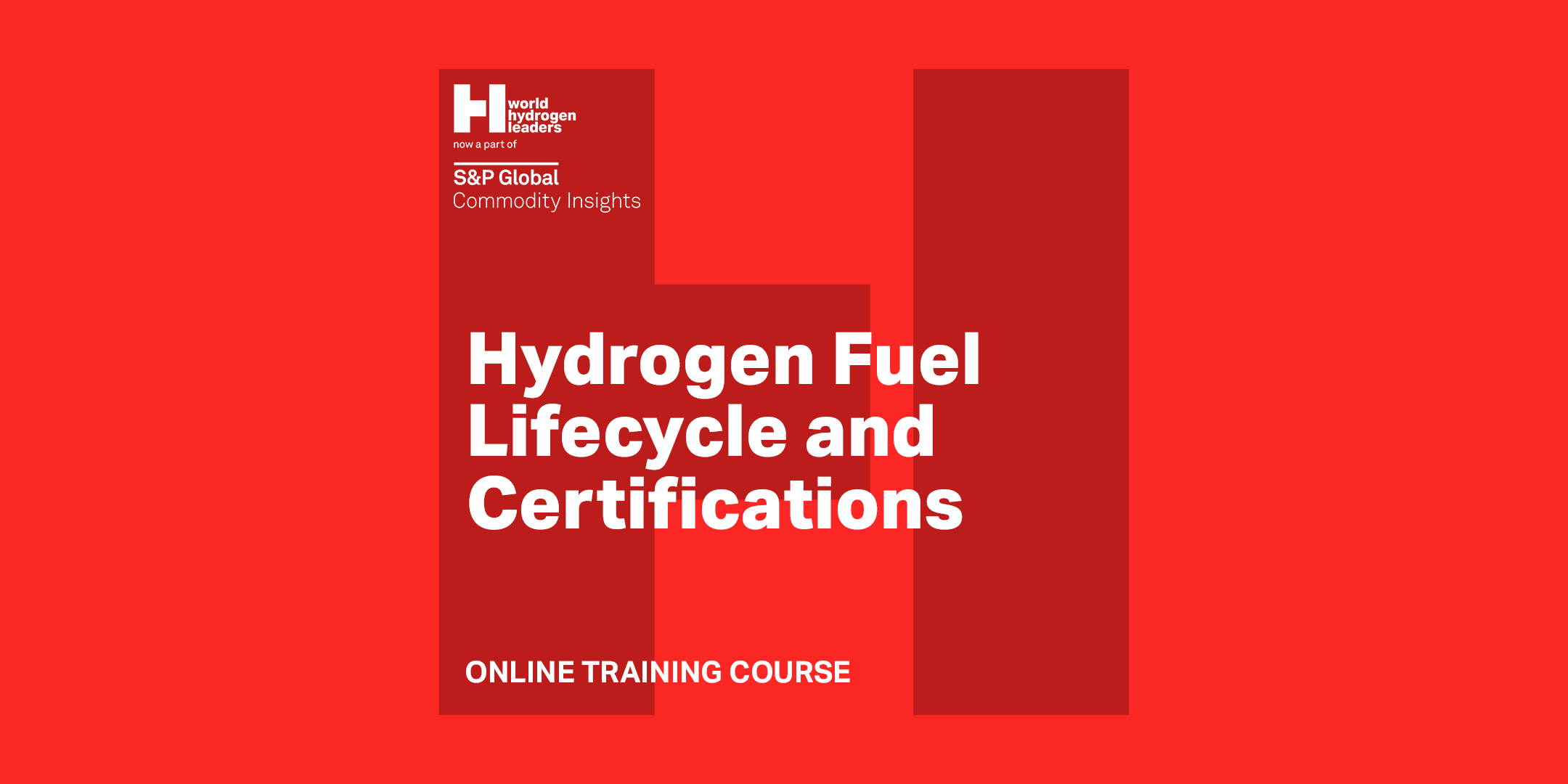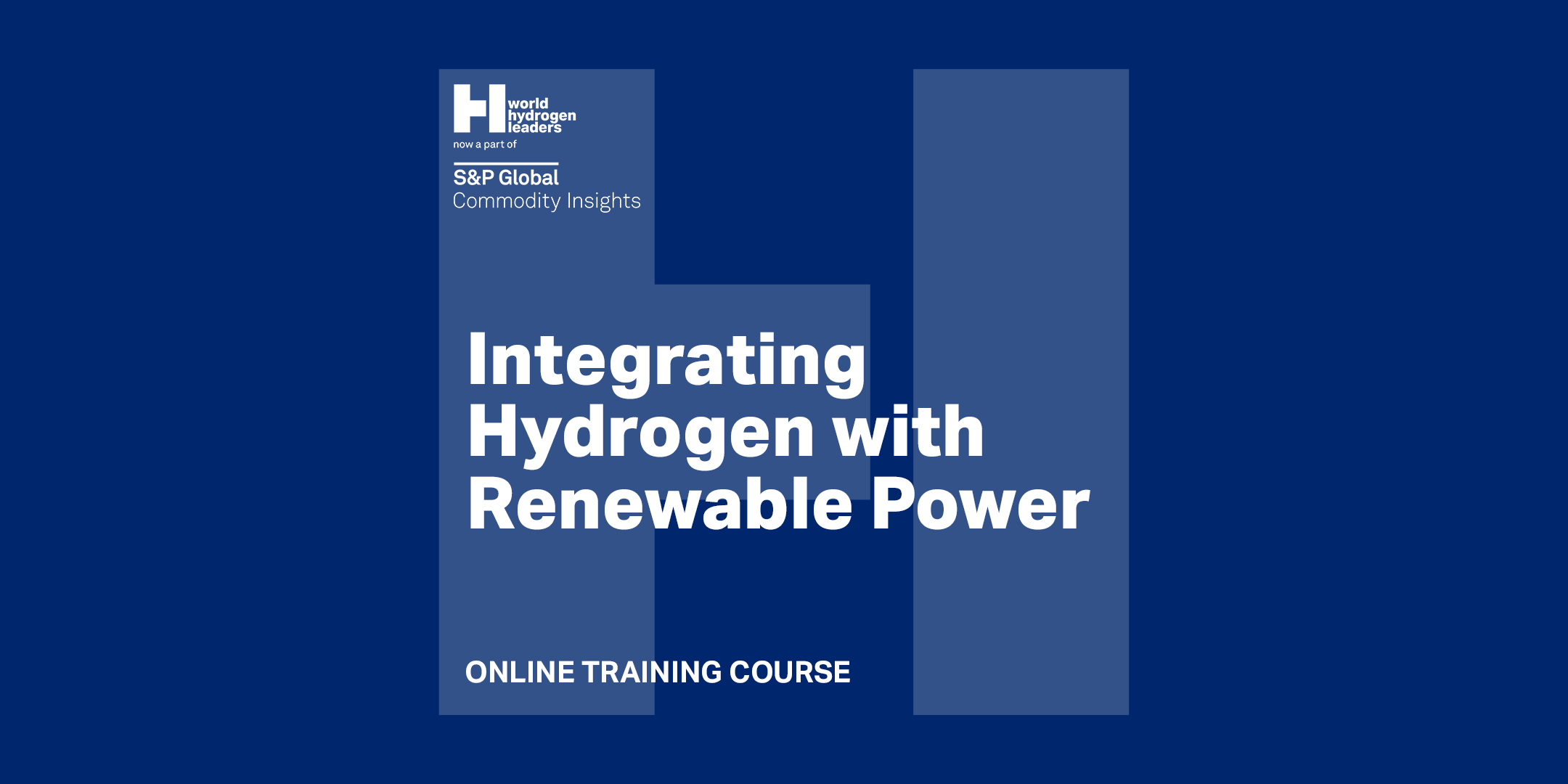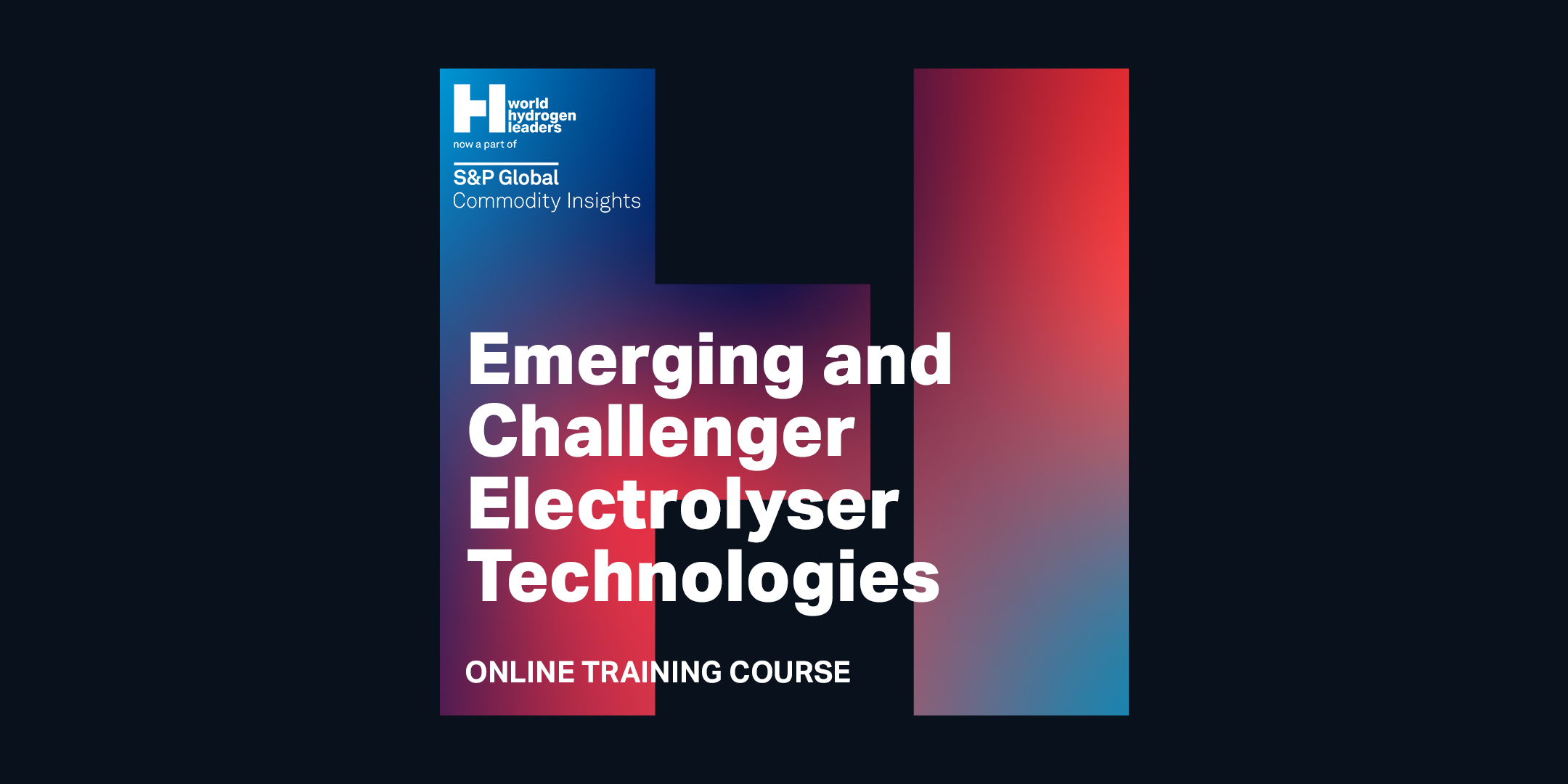
Green Hydrogen Economics
This course is designed to give a clear examination of the factors that will determine the economics and competitiveness of hydrogen produced by electrolysis. It will examine economics in terms of levelised cost and project financial modelling, assessing the impacts of factors such as capital cost reductions, electrolyser efficiency, load factor, co-product sales and financing costs.

Hydrogen Fuel Lifecycle and Certifications
The "Hydrogen Fuel Lifecycle and Certifications" three-day course is tailored to meet the needs of hydrogen practitioners who are already familiar with the basics of hydrogen technology and want to gain deeper insights into the hydrogen fuel lifecycle, including its components, and explore certification requirements.

Integrating Hydrogen with Renewable Power
This course is a time-efficient and accessible examination of the factors that need to be considered when connecting hydrogen production to renewable power generation. Over three sessions, the course will explain the crucial technical, economic and market context considerations, illustrating key concepts with both market trend data and simple, Excel-based calculations and models.

Clean Ammonia
This time-efficient training course will provide attendees with a comprehensive and up-to-date introduction to ammonia today and its prospects in a decarbonised world. Aimed at those in commercial, business-focused roles, including business development, strategy planning and investment, attendees will gain a clear description of the key technologies in language easily accessible to non-engineers.

Hydrogen Carbon Accounting
This is a specialised course designed to equip professionals in the hydrogen sector with a solid understanding of lifecycle thinking and greenhouse gas (GHG) quantification, empowering participants to engage in and scale up their work in carbon accounting and sustainability initiatives.

E-SAF: Short-term Headwinds, Long-term Take-off
This course offers an overview of the global E-SAF market, covering pathways for creating e-fuels, applications of e-fuels, e-SAF legislation, the status of projects, investments and challenge, supply and demand, and costs!

Green Hydrogen Projects
Throughout the course, your expert trainer will separate what is really happening in the market from some of the headlines and hype, helping you to identify credible near-term opportunities for your business, along with the associated risks. He will evaluate and quantify barriers to long-term scalability and illustrate throughout using examples and benchmarks taken from a global perspective.

Carbon Capture, Utilisation & Storage
This course is intended for those in business, commercial and strategically focused roles within the energy sector; in particular those responsible for environmental matters, business sustainability and business transformation in areas such as oil & gas, hydrogen and industrial energy usage.

Sustainable Finance
This forward-looking training will dive into sustainable finance, helping you to better understand the future of clean energy investment.

Integrating Hydrogen with Renewable Power
This course is a time-efficient and accessible examination of the factors that need to be considered when connecting hydrogen production to renewable power generation. Over three sessions, the course will explain the crucial technical, economic and market context considerations, illustrating key concepts with both market trend data and simple, Excel-based calculations and models.

Power to X to Power
If you are investing in the Power to X, X to power or the full cycle of Power to X to Power, then an appreciation of the technologies involved is required. Understanding the market drivers and options for the potential molecules for use in Power to X to Power is essential. This course will provide insights support all these processes.

Green Hydrogen Economics
This course is designed to give a clear examination of the factors that will determine the economics and competitiveness of hydrogen produced by electrolysis. It will examine economics in terms of levelised cost and project financial modelling, assessing the impacts of factors such as capital cost reductions, electrolyser efficiency, load factor, co-product sales and financing costs.

Emerging and Challenger Electrolyser Technologies
This course will provide tangible examples of emerging and challenger technologies for green hydrogen generation from electrolysis. Many of the electrolysis technologies covered in this course have the potential to become mainstream green hydrogen production routes in future decades and will challenge established equipment and well-known electrolyser industry names.

Natural (White) Hydrogen
If you are investing in the production of hydrogen, an appreciation of the alternatives is required. White hydrogen may feature as one of these alternatives in the future, either as your source, or a competitive option to your mode of production. Understanding the market drivers and the economics of the most competitive sources is essential. This course will provide insights into all these areas.

Hydrogen Storage, Transport & Distribution
This course is intended for those seeking a thorough understanding of how hydrogen fuel can be stored, transported and distributed from production to end-use – and why this is of central importance in determining how the hydrogen landscape will develop.

The Hydrogen Investment Gap: Realising the Promise of Clean Hydrogen Projects
An in depth analysis of the business case and investment analysis for the current batch of electrolyser based projects. A theme of the session is ‘Mind the Gap’ the difference between hope and reality for electrolyser based projects due to gaps due to capacity growth, operating performance and learning curve costs ; and hence the gap between hope of financial investment decisions and financial closure with reality of many fewer than expected.

Green Hydrogen Projects
Throughout the course, your expert trainer will separate what is really happening in the market from some of the headlines and hype, helping you to identify credible near-term opportunities for your business, along with the associated risks. He will evaluate and quantify barriers to long-term scalability and illustrate throughout using examples and benchmarks taken from a global perspective.

Sustainability and Export Criteria for Hydrogen
This course includes an overhaul and introduction to sustainability in the context of the hydrogen supply chain recognizing investment approaches through ESG metrics and exporting criteria with close emphasis on the EU’s CBAM requirements.

Sustainable Hydrogen: Assessing Production, Storage, Utilisation and Integration
This course aims to explore hydrogen as a sustainable energy carrier by focusing on its production, storage, and applications. Through presentations, case analyses, and interactive discussions, participants will gain insights into the methodologies for assessing the sustainability of hydrogen energy, its potential to aid the energy transition, and its applicability across various sectors.

Electrolyser Manufacturing Supply Chains
Green hydrogen is central to the energy transition. Accordingly, the scale of electrolyser production is in an exponential phase of growth. This course will provide essential insights to support the decisions that need to be taken to ramp up electrolyser production and de-risk electrolyser procurement.

Carbon Capture, Utilisation & Storage
This course is intended for those in business, commercial and strategically focused roles within the energy sector; in particular those responsible for environmental matters, business sustainability and business transformation in areas such as oil & gas, hydrogen and industrial energy usage.

Integrating Hydrogen with Renewable Power
This course is a time-efficient and accessible examination of the factors that need to be considered when connecting hydrogen production to renewable power generation. Over three sessions, the course will explain the crucial technical, economic and market context considerations, illustrating key concepts with both market trend data and simple, Excel-based calculations and models.

Mastering Corporate PPAs
Understand the corporate PPA in context and deep-dive into the key features and overall structure of the corporate PPA. This highly specific course will introduce the legal, financial and technical structure and hidden pitfalls of PPAs as a means for Sellers and Buyers to minimise their exposure to the volatility of price and volume.

Hydrogen Fuel Lifecycle and Certifications
The "Hydrogen Fuel Lifecycle and Certifications" three-day course is tailored to meet the needs of hydrogen practitioners who are already familiar with the basics of hydrogen technology and want to gain deeper insights into the hydrogen fuel lifecycle, including its components, and explore certification requirements.

Turquoise Hydrogen from Natural Gas and Biomethane
Turquoise hydrogen is made from methane using pyrolysis. This course will introduce the main technologies for producing turquoise hydrogen and identify the companies leading their development and commercialisation. The course will also explore current and emerging high scale applications for the solid carbon and graphite that are produced through these processes.

Blue Hydrogen, Ammonia and Methanol
This course will explain how thermochemical hydrogen production technologies such as SMR, ATR and POX fit with integrated carbon capture. The optimum technologies for on-purpose blue hydrogen production are different to those that have been favoured for grey hydrogen. If you are investing in the hydrogen economy or considering technologies to implement, a review of the options will be essential.

SAF: Hydrogen and Derivatives as Aviation Fuels
If you are investing in the production, storage, distribution, or use of SAF, eSAF or hydrogen for aviation then an appreciation of the alternatives is required. Understanding the market drivers and most likely use cases is essential. Similarly for aviation sector operators, understanding the range of fuels available is essential.

Underground Hydrogen Storage
This course will cover some of the high-capacity storage options and explain in which situations each may be suitable. The seasonality of some production and use-cases will also be covered to underline the importance of high-capacity hydrogen storage.

Hydrogen Pipelines for Transmission and Distribution
This course will provide examples of major schemes that have been proposed for pipeline hydrogen transmission and distribution and outline the testing work that has taken place to confirm whether hydrogen can indeed be admixed into natural gas and under what conditions existing infrastructure can be adapted for use with hydrogen.

Green Hydrogen Economics
This course is designed to give a clear examination of the factors that will determine the economics and competitiveness of hydrogen produced by electrolysis. It will examine economics in terms of levelised cost and project financial modelling, assessing the impacts of factors such as capital cost reductions, electrolyser efficiency, load factor, co-product sales and financing costs.

Hydrogen from Waste and Biomass
This course will provide tangible examples of chemcycling and waste to hydrogen pathways and technologies for green hydrogen generation from biomass. Some of the processes are used at scale today; others are plans for the future. Many of the technologies covered in this course have the potential to become viable low-carbon hydrogen production routes in future decades.

Clean Ammonia
This time-efficient training course will provide attendees with a comprehensive and up-to-date introduction to ammonia today and its prospects in a decarbonised world. Aimed at those in commercial, business-focused roles, including business development, strategy planning and investment, attendees will gain a clear description of the key technologies in language easily accessible to non-engineers.

Hydrogen Market Entry Strategies
The course first provides the necessary tools to select attractive hydrogen markets based on defined criteria and business goals of the company entering the market. It offers different approaches to enter hydrogen markets based on the company starting point and comparative advantages, while also defining the business processes and team choices required.

Powering the Hydrogen Economy: Unlocking the Potential of Offshore Wind
An in depth analysis of the current status of green hydrogen production associated with existing and new offshore wind projects. The analysis is based on an expert view of the business cases, investment analyses and project developments across the industry with a focus on a range of current examples

Hydrogen Geopolitics & Geoeconomics: Europe - Americas -Caribbean
Hydrogen Geopolitics & Geoeconomics: Europe / Americas / Caribbean is an expansive three-day online course, positioned as the third session in a series exploring the global hydrogen market's geopolitics and geoeconomics. This instalment shifts the focus to the interplay between Europe, the Americas, and the Caribbean in the hydrogen sector. The course aims to analyse the unique geopolitical relationships, market synergies, and policy landscapes that define hydrogen energy's role in these regions.
